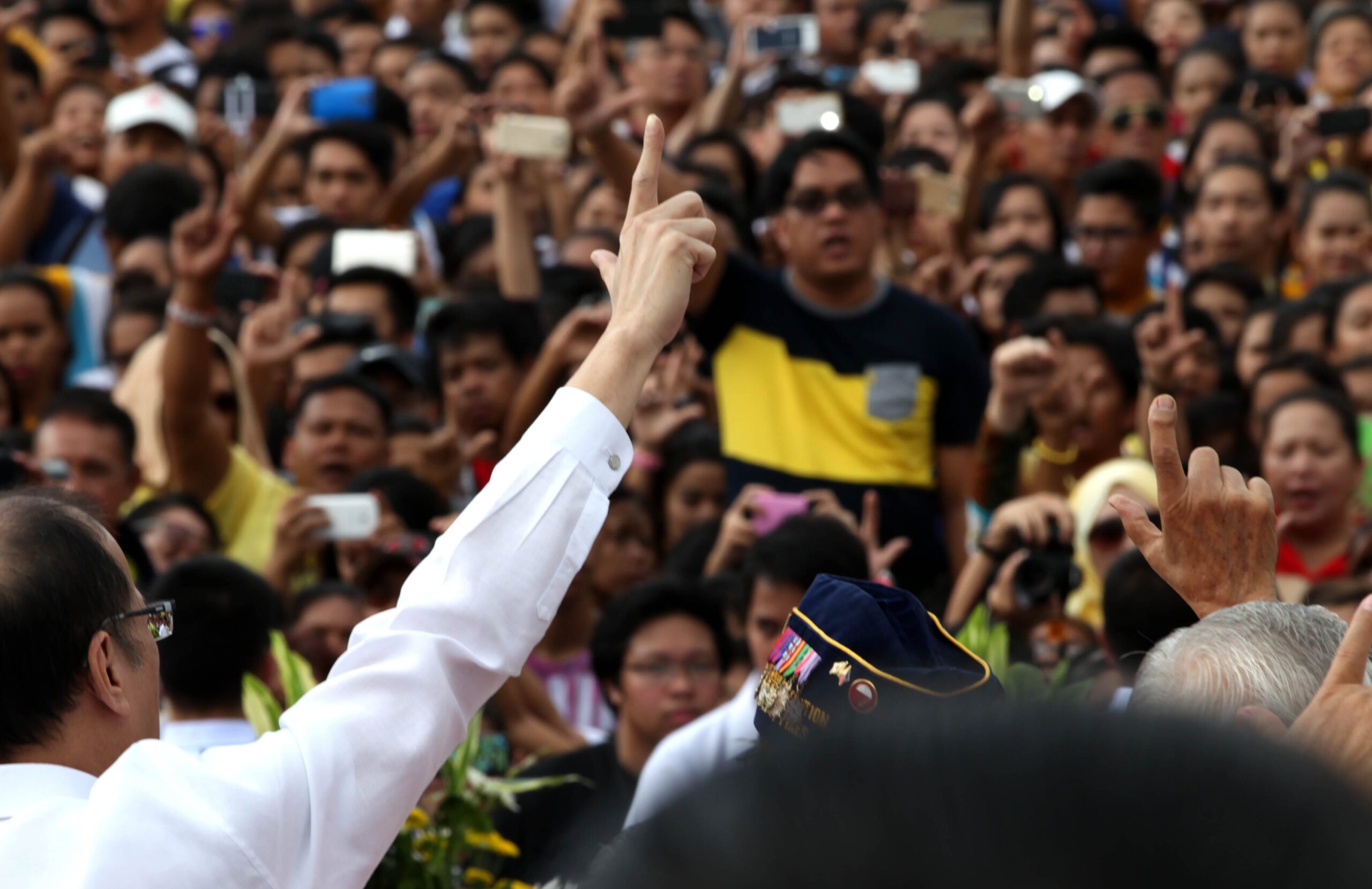SUMMARY
This is AI generated summarization, which may have errors. For context, always refer to the full article.

MANILA, Philippines – “This is about the truth versus amnesia.”
Malacañang made the statement in defense of President Benigno Aquino III’s remarks at the 30th anniversary of the EDSA People Power Revolution, where he reminded Filipinos – especially those too young to know – about the horrors of the Marcos regime that culminated in the popular revolt.
In an interview on state-run radio dzRB on Saturday, February 27, Undersecretary Manuel Quezon III, Presidential Communications Development and Strategic Planning Office head, was asked about the statement of Senator Ferdinand “Bongbong” Marcos Jr that Aquino’s EDSA speech reflected his “divide and rule tactic” that sowed disunity among Filipinos.
The younger Marcos, whose father led a two-decade authoritarian regime marred by repression and human rights abuses, is running for vice president in the 2016 polls. He topped the latest pre-election survey with Senator Francis Escudero.
In response, Quezon cited statistics on the number of people who were killed, detained, or tortured during the martial law years.
“The tactic of the administration is to fight disinformation with facts,” Quezon said.
“Let’s not forget that 75,730 persons have filed their claims in the Human Rights Victims’ Claims Board as victims of human rights violations during martial law,” he added.
Quezon went on to cite more figures of people who suffered under the Marcos regime:
- An estimated 70,000 people detained for being enemies of the state
- About 398 enforced disappearances
- At least 3,240 victims of extra-judicial killings
- About 34,000 people who suffered electric shock torture, rape, and molestation
He also noted how the national debt ballooned from P2.4 billion in 1965 to P192.2 billion by 1985. (READ: Ferdinand Marcos’ economic disaster)
In 1986, the late dictator was ousted and the Marcoses forced to flee the Philippines after a popular uprising – the People Power Revolution – restored democracy and installed the late President Corazon Aquino to power.
“So what we’re saying is, just like what the President said in his speech, this is not about the Aquinos versus the Marcoses. This is about the truth versus amnesia,” Quezon said.
On the 30th anniversary of the EDSA revolution on February 25, Aquino warned that there was no certainty that the younger Marcos would not repeat his father’s mistakes.
The senator has adamantly refused to recognize and apologize for the atrocities that Filipinos suffered during the martial law years.
“Kung hindi man lang niya makita ang mali sa ginawa ng kanilang pamilya, paano tayo aasang hindi niya ito uulitin? Ang akin nga, thank you na lang, dahil kahit papaano nagpakatotoo ka sa pagpapakitang handa kang tularan ang iyong ama. Linawin ko na rin lang po: Hindi ito usapin ng Aquino laban sa Marcos; malinaw na malinaw sa akin na laban ito ng tama at mali,” Aquino said.
(If he can’t even see the wrongdoings of his family, how can we hope that he would not repeat them? I thank you for being honest enough to show that you’re ready to take after your father. Let me just repeat: This is not a case of Aquino versus Marcos. It’s very clear to me that this is a fight between right and wrong.)
In a visit to Pangasinan province on Friday, however, the younger Marcos said he does not want to see a repeat of military rule in the country.
In his speech during the EDSA anniversary, Aquino also slammed revisionist accounts of the martial law years, saying it was not the Philippines’ “golden age” as some claim it to be.
During the Sunday interview, Quezon highlighted the achievements of the Aquino administration, citing it as proof of the Philippines’ “complete turnaround” from being considered the “sick man of Asia.”
Earlier this week, the President inspected various infrastructure projects in Bulacan and Nueva Ecija, and led the ceremonial switch-on for the electrification of 1,199 sitios in Region III.
These projects, among others, have allowed Filipinos and businessmen to see the Philippines in a favorable light, Quezon said.
But for progress to continue, Filipinos must choose their next leaders wisely.
“Do we want a president who will lead us to another dictatorship or an uncertain future? Or do we want to be led by a competent candidate with unquestioned integrity? Once again, our nation’s fate is in our hands,” Quezon said. – Rappler.com
Add a comment
How does this make you feel?
There are no comments yet. Add your comment to start the conversation.